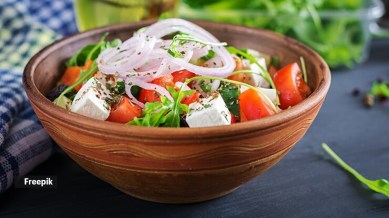📣 For more lifestyle news, click here to join our WhatsApp Channel and also follow us on Instagram
4 common salad mistakes that can lead to secret glucose spikes
High and prolonged glucose spikes have lasting and detrimental impacts on many hormones and proteins, including those that trigger inflammation, which is linked to diabetes and heart disease.

From green vegetables to colourful fruits and herbs, the season offers foodies a plethora of ingredients to whip up some fantastic dishes, including fresh salads! Crunchy and full of flavour, salads make for a wonderful side or main dish, depending on the components. Extremely rich in fibre, they are great for gut health as they feed the microbiome and also add satiety value, helping keep weight in check.
Meenu Balaji, chief nutritionist at Pragmatic Nutrition, Chennai, told indianexpress.com that salads are a great addition to any meal. But she warned that the following common mistakes can counteract the effects and increase your blood glucose levels:
monthly limit of free stories.
with an Express account.
1. Fruit overload: Adding too many fruits can easily add up to calories. Make sure you portion your fruit salad. Pair the fruits with some chopped nuts or a teaspoon of seeds to reduce the rapid blood glucose spike.
2. Salad dressing: Salad dressings like mustard, honey, maple syrup, or sweet vinaigrette have hidden sugars. Check the label of your salad dressing to see how much sugar it contains and use it accordingly.
3. Skipping protein: Including too many carbs but not enough protein, like lentils, chicken, boiled eggs, or tofu. Protein takes longer to digest and, therefore, keeps you full longer. We also need more calories to digest protein, which we call the thermic effect of food.
4. Missing out on fats: Healthy fats are a must in salads. They provide satiety and aid in the absorption of fat-soluble nutrients.
“A pro tip? If you have a raw salad, adding an oil-based dressing actually improves the nutritional value. You could also add a handful of nuts or mashed avocados,” suggested Balaji.
Ideal sequence to eat
Dr Pooja Pillai, Consultant Physician and Diabetologist at Aster CMI Hospital, Bengaluru, said that for those watching their blood sugar levels, especially diabetics, having a bowl of salad before eating carbohydrates isn’t just a healthy habit but a smart blood sugar management strategy.
“Raw salads rich in fibre help slow down the absorption of glucose from carbohydrates, preventing sudden sugar spikes post-meal. Ideal salads include cucumber, tomatoes, carrots, bell peppers, and leafy greens like spinach or lettuce,” she explained.
According to her, a glucose spike occurs in your bloodstream about 30-60 minutes after you eat carbohydrates. Many things determine how high and how long the peak lasts; these include what you ate with or before the carbohydrate, how much fibre is in the carbohydrate, and your body’s ability to secrete and use the hormone insulin.
Why is this necessary?
For people with certain medical conditions, any tactic to flatten the glucose peak is incredibly important. These conditions include: diabetes, reactive hypoglycaemia (a particular type of recurring sugar crash), postprandial hypotension (low blood pressure after eating), or if you’ve had bariatric surgery.
Dr Pillai explained that this is because high and prolonged glucose spikes have lasting and detrimental impacts on many hormones and proteins, including those that trigger inflammation. Inflammation is linked with a range of conditions, including diabetes and heart disease.
“Proteins and fats also slow gastric emptying. Protein has the extra advantage of stimulating a hormone called glucagon-like-peptide 1 (or GLP1). When protein from your food hits the cells in your intestines, this hormone is secreted, slowing gastric emptying even further. The hormone also affects the pancreas, where it helps the secretion of the hormone insulin that mops up the glucose in your blood,” she added.
📣 For more lifestyle news, click here to join our WhatsApp Channel and also follow us on Instagram